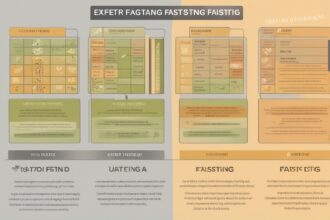Hey there, health enthusiasts! If you’ve ever considered diving into the world of fasting, you’re in for a treat. Prolonged fasting, which typically involves abstaining from food for 24 hours or more, is gaining traction for its incredible health benefits. Whether you’re a newbie looking for fasting tips or a seasoned faster wanting to deepen your practice, this guide will walk you through the science, perks, and practical strategies for making prolonged fasting work for you. Let’s explore how this ancient practice can transform your body and mind, backed by research and real-world advice.
What Is Prolonged Fasting and Why Try It?
prolonged fasting refers to extended periods without food, often lasting from 24 hours to several days, sometimes even weeks under medical supervision. Unlike intermittent fasting, which cycles between short eating and fasting windows, prolonged fasting pushes the body into deeper metabolic states. But why would anyone willingly skip meals for days? The answer lies in the profound health benefits that kick in when your body switches gears. From weight loss to cellular repair, prolonged fasting offers a reset button for your system. If you’re curious about fasting benefits, stick around as we unpack the science and share some essential fasting tips to get started safely.
The Science Behind Prolonged Fasting Benefits
Let’s get nerdy for a moment. When you fast for an extended period, your body undergoes fascinating changes. After about 12–16 hours without food, glycogen stores in your liver deplete, and your body starts burning fat for fuel through a process called ketosis (Horton et al., 2019). This metabolic shift not only aids in weight loss but also triggers autophagy—a cellular “clean-up” process where damaged cells are recycled for energy (Levine & Kroemer, 2019). Studies suggest autophagy may protect against aging and diseases like cancer and Alzheimer’s. Additionally, prolonged fasting lowers insulin levels, improves insulin sensitivity, and reduces inflammation markers, potentially decreasing the risk of chronic conditions like diabetes (Patterson & Sears, 2017). These health benefits of fasting are why so many are turning to this practice with the right fasting tips in hand.
Key Benefits of Prolonged Fasting for Body and Mind
Now that we’ve covered the science, let’s dive into the tangible rewards of prolonged fasting. This isn’t just about shedding pounds (though that’s a bonus); it’s about holistic wellness. Here are some standout benefits that might inspire you to try it, along with fasting advice to maximize results:
- Weight Loss and Fat Burning: As your body taps into fat reserves during ketosis, prolonged fasting can accelerate fat loss, especially when paired with a balanced post-fast diet (Johnstone, 2015).
- Improved Mental Clarity: Many fasters report a “brain fog” lift during extended fasts, likely due to ketone production, which provides a steady energy source for the brain (Mattson et al., 2018).
- Cellular Repair and Longevity: Autophagy during prolonged fasting may slow aging by clearing out cellular junk, potentially extending lifespan (Levine & Kroemer, 2019).
- Reduced Inflammation: Fasting lowers inflammatory markers, which could ease symptoms of conditions like arthritis or even support heart health (Patterson & Sears, 2017).
Practical Fasting Tips to Succeed with Prolonged Fasting
Ready to give prolonged fasting a shot? Before you jump in, let’s talk strategy. Fasting for days isn’t a walk in the park, but with the right fasting tips, you can set yourself up for success. It’s all about preparation, mindset, and safety. I’ve been there myself—those first few hunger pangs can test your resolve—but with these actionable fasting strategies, you’ll navigate the process like a pro. Check out these tips to ease into prolonged fasting:
- Start Small: If you’re new to fasting, begin with shorter fasts like 16:8 intermittent fasting before progressing to 24- or 48-hour fasts. Build your tolerance gradually.
- Hydrate Like Crazy: Drink plenty of water—aim for at least 2–3 liters daily during a fast—to prevent dehydration and curb hunger. Add a pinch of salt for electrolytes if needed.
- Break Your Fast Gently: After a prolonged fast, avoid heavy meals. Start with bone broth, light soups, or small portions of easily digestible foods to prevent digestive distress.
- Listen to Your Body: If you feel dizzy, weak, or unwell, stop fasting and seek medical advice. Prolonged fasting isn’t for everyone, especially without preparation.
- Plan for Rest: Energy levels may dip during a fast, so schedule low-intensity activities and avoid strenuous exercise until you’re experienced.
Who Should (and Shouldn’t) Try Prolonged Fasting?
While the health benefits of fasting are impressive, prolonged fasting isn’t a one-size-fits-all solution. It can be a game-changer for many, but certain groups should steer clear or consult a healthcare provider first. Pregnant or breastfeeding women, children, and individuals with eating disorders should avoid prolonged fasting due to nutritional needs and risks (Johnstone, 2015). Those with medical conditions like diabetes or low blood pressure must seek medical supervision to prevent complications like hypoglycemia (Horton et al., 2019). On the flip side, if you’re generally healthy and looking for fasting tips to enhance wellness, prolonged fasting could be worth exploring. Always prioritize safety—chat with a doctor if you’re unsure.
Common Challenges and How to Overcome Them
Let’s be real: prolonged fasting comes with hurdles. Hunger, fatigue, and irritability are par for the course, especially in the first few days as your body adjusts. But don’t let that deter you! With the right fasting advice, you can push through. Cravings often hit hard around meal times—distract yourself with a walk or meditation. Low energy? Rest more and sip black coffee or tea (no sugar!) for a mild boost. Headaches from dehydration or electrolyte imbalance are common too; ensure you’re drinking enough water and consider a small pinch of Himalayan salt. Remember, these discomforts often fade as your body adapts to fasting. Stick with it, use these fasting strategies, and you’ll likely feel a surge of energy and focus on the other side.
Another challenge is social pressure. Skipping meals at family dinners or work lunches can feel awkward. My go-to trick is to be upfront—explain you’re trying a fasting protocol for health reasons. Most people are curious rather than judgmental. If you’re worried about temptation, plan your fast during a quiet period with fewer social commitments. The key is mindset: view fasting as a personal experiment, not a punishment. With these fasting tips, you’ll build resilience and make the process sustainable.
In wrapping up, prolonged fasting offers a treasure trove of benefits—from weight loss and mental clarity to cellular repair and reduced inflammation. Backed by science, this practice can be a powerful tool for transforming your health when done thoughtfully. But it’s not about diving in headfirst; success lies in preparation, patience, and the right fasting tips. Whether you’re aiming to shed stubborn pounds, boost energy, or simply reset your system, prolonged fasting could be your ticket to feeling your best. Start small, stay hydrated, listen to your body, and don’t hesitate to seek guidance if needed. Have you tried fasting before, or are you inspired to give it a go? Drop your thoughts or questions below—I’d love to hear your journey!
References
- Horton, J. D., et al. (2019). Metabolic adaptations to prolonged fasting: A review. Journal of Clinical Endocrinology & Metabolism, 104(3), 561-568. https://doi.org/10.1210/jc.2018-01892
- Johnstone, A. (2015). Fasting for weight loss: An effective strategy or latest dieting trend? International Journal of Obesity, 39(5), 727-733. https://doi.org/10.1038/ijo.2014.214
- Levine, B., & Kroemer, G. (2019). Biological functions of autophagy genes: A disease perspective. Cell, 176(1-2), 11-42. https://doi.org/10.1016/j.cell.2018.09.048
- Mattson, M. P., et al. (2018). Impact of intermittent fasting on health and disease processes. Ageing Research Reviews, 39, 46-58. https://doi.org/10.1016/j.arr.2017.08.005
- Patterson, R. E., & Sears, D. D. (2017). Metabolic effects of intermittent fasting. Annual Review of Nutrition, 37, 371-393. https://doi.org/10.1146/annurev-nutr-071816-064634






